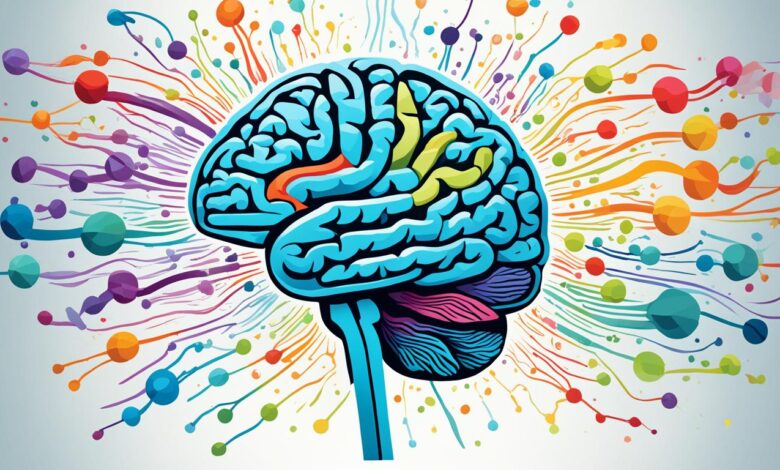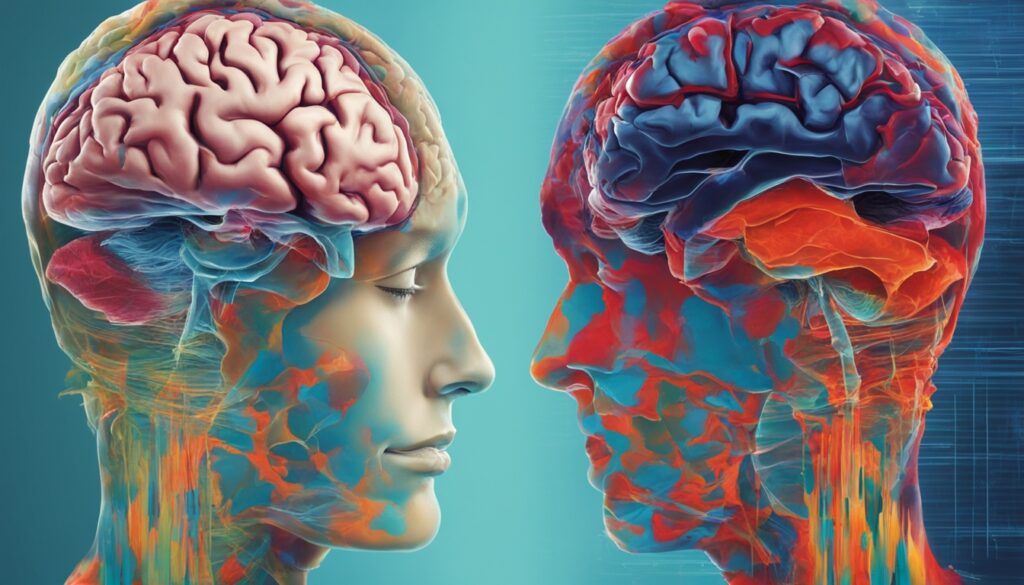Understanding What Causes Bipolar Disorder

Many people misunderstand Bipolar Disorder etiology. It’s a topic full of mystery. Some believe that bipolar disorder triggers are not only in our genes. They think science supports this idea. It’s a journey to discover what causes Bipolar Disorder.
Think of it as a puzzle. Each piece is a clue – like genes, life events, and mental factors. Putting these pieces together helps us understand causes of Bipolar Disorder. It also guides us on how to treat and prevent it. This article looks deeply into factors contributing to Bipolar Disorder.
We will study Bipolar Disorder risk factors from all angles. We’ll examine genetic links, environmental triggers, and brain chemistry. Come along as we explore the complex world of Bipolar Disorder Etiology. We’re on a mission to solve one of the toughest mental health mysteries.
The Intricate Web of Bipolar Disorder Etiology
The study of bipolar disorder shows a mix of genetic, psychological, and environmental elements. Brain chemistry and neurotransmitters also play a key role. They are crucial in starting and progressing the disorder.
Defining Bipolar Disorder and Its Scope
Bipolar disorder causes big changes in mood, energy, and how well someone can do tasks. This disorder includes two main types of episodes: mania and depression. Bipolar Disorder Definition explains it well. In mania, a person feels overly happy or irritable. Depression makes someone feel very sad and low on energy.
The Role of Neurotransmitters and Brain Chemistry
The Role of Neurotransmitters in Bipolar Disorder is critical. These chemicals in our brain help control our feelings and mood. Brain Chemistry and Bipolar Disorder are closely linked. Changes in the levels of these chemicals can cause the mood swings seen in bipolar disorder. By studying these chemicals, we can learn more about the disorder. This helps in finding better treatments.
| Neurotransmitter | Function | Implications in Bipolar Disorder |
|---|---|---|
| Serotonin | Regulates mood, appetite, and sleep | Low levels can lead to depression; irregularities linked to mood swings |
| Dopamine | Controls reward and pleasure centers | Excessive levels contribute to mania; deficient levels to depression |
| Norepinephrine | Handles stress responses and alertness | An imbalance can disrupt emotional balance, triggering episodes |
Recent studies show the complexity in how neurotransmitter systems interact. They suggest bipolar disorder’s causes and effects might be broader than we thought. A deep look at a person’s brain chemistry is key for effective bipolar disorder treatment plans.
Genetic Predispositions to Bipolar Disorder
Research into Bipolar Disorder and Genetics shows that Genetic Factors in Bipolar Disorder play a big role. Studies find people with a Bipolar Disorder Family History have a higher risk. Yet, this doesn’t mean they will definitely get the condition.
Studies on families have pointed out various genes linked with bipolar disorder. It’s not caused by just one gene. Many genes interacting with each other seem to lead to the disorder.
| Chromosome | Associated Gene Loci | Potential Impact on Bipolar Disorder |
|---|---|---|
| 1 | ANK3, CACNA1C | Regulates neuronal excitability; implicated in mood regulation. |
| 3 | ODZ4 | May play a role in neural development and signaling. |
| 6 | NOTCH4 | Involved in neurodevelopment; may influence brain structure anomalies linked with bipolar disorder. |
| 10 | BDNF | Essential for learning and memory; involved in neuronal growth and survival. |
| 22 | TRANK1 | Associated with the regulation of mood and response to stress. |
Genetic Factors in Bipolar Disorder point to a biological base. But we also need to think about how genetics play with environment and personal history. Scientists are still figuring out how genetics affect bipolar disorder. They want to make diagnosis and treatments better.
People from families with bipolar disorder should look into genetic counseling. Catching symptoms early can help. Early action might lessen the impact of bipolar disorder. It could improve life for those at risk.
Stressful Life Events as Bipolar Triggers
People with bipolar disorder often find that stress triggers their symptoms. Bipolar disorder triggers mainly include stressful life events. For instance, losing a job, facing money problems, or dealing with major personal issues can lead to mania or depression. Knowing these triggers helps both the person and healthcare teams. They can work on ways to lessen stress effects and avoid worsening symptoms.

Stressful events are closely linked to bipolar disorder. The end of a relationship, losing someone close, or experiencing trauma can push someone’s mental health off balance. Realizing the impact of these triggers is key to controlling bipolar disorder. It enables people to act early to stay mentally stable.
Research says stress isn’t just a trigger for the first manic or depressive episode. It also plays a big role in repeating episodes. So, handling stress is a core part of treating bipolar disorder well.
Avoiding the link between stressful life events and bipolar disorder is crucial. Learning to be resilient and using coping skills like mindfulness or cognitive therapy helps. These strategies lower the chances and impact of stress-triggered episodes. Also, having a supportive circle, in personal and work life, adds extra protection against bipolar triggers.
Environmental Influences on Bipolar Disorder Development
Looking at the environmental aspects of bipolar disorder gives us a wider view of this mental health challenge. These factors aren’t just about where we live. They include society, our relationships, and cultural impacts too. It’s important to study these because they mix with genetics. This mix affects how likely someone is to get bipolar disorder and what it looks like for them.
Understanding the Impact of Social Factors
The relationship between Social Factors and Bipolar Disorder shows how our interactions matter for mental health. Good relationships and support can protect us against mental health problems. But without support, isolation, and stigma from society, bipolar disorder symptoms can get worse. Stress from things like school or work adds more pressure, possibly leading to depression or mania.
The Significance of Trauma and Early Life Stressors
Another key element is Trauma and Bipolar Disorder. Studies say bad experiences, especially during childhood, make psychiatric disorders more likely. This includes bipolar disorder. Tough times like losing a parent, facing abuse, or seeing violence change how the brain handles stress. These impacts are big, showing why it’s critical to help those at risk early on.
Finally, digging into Environmental Factors in Bipolar Disorder makes us understand this issue better. The role of relationships and personal trauma plays a big part. It’s clear that how we grow up and live, mixed with our genes, deeply affects bipolar disorder’s start and journey.
The Relationship Between Sleep Disturbances and Bipolar Episodes
The link between Sleep and Bipolar Disorder is well-studied. It shows that sleep problems greatly affect bipolar disorder management. These sleep issues are not just symptoms; they can predict mood changes. It’s vital to look into these issues and include them in treatment plans.
Examining Patterns of Sleep and Mood Fluctuations
For people with bipolar disorder, how well they sleep affects their day a lot. Mood Fluctuations and Sleep Patterns are closely linked. Sleep problems usually happen with manic or depressive periods. During manic times, individuals may struggle to sleep because they feel very energized and have too many thoughts. But during depression, they may sleep too much or find it hard to stay awake.
The Consequences of Disrupted Sleep on Mental Health
It’s crucial to tackle the Mental Health Consequences of Disrupted Sleep in bipolar disorder treatment. Bad sleep can make symptoms worse. This includes making poor choices, having trouble thinking, and feeling more emotionally unstable. By focusing on better sleep, we can lessen these issues. This makes sleep health very important for patients and doctors in treating bipolar disorder well.
Physical Illness and Its Correlation with Bipolar Disorder
The link between Bipolar Disorder and Physical Illness doesn’t get enough attention. Yet, it’s vital to understand that people with bipolar disorder are more likely to have certain health problems. This connection between Physical Health and Bipolar Disorder works both ways, affecting both health and treatment.

Heart disease, diabetes, and obesity are more common in those with bipolar disorder. This is due to a mix of lifestyle, medication side effects, and the stress of managing a mood disorder. So, it’s important to look after both psychiatric and physical health in people with bipolar disorder.
| Physical Illness | Impact on Bipolar Disorder | Considerations for Management |
|---|---|---|
| Cardiovascular Disease | May worsen mood swings and complicate medication regimens | Regular monitoring and integrative treatment approaches |
| Diabetes | Can be exacerbated by certain bipolar medications, affecting mood stability | Attention to diet, exercise, and medication interactions |
| Obesity | Increased risk due to lifestyle factors and medication side effects | Support for healthy lifestyle changes and weight management programs |
| Thyroid Dysfunction | Hypothyroidism can mimic depressive episodes; hyperthyroidism can resemble mania | Thyroid screening and adjustments to treatment as needed |
Understanding how Bipolar Disorder and Physical Illness relate is key for complete care. Health experts must focus on regular screenings and preventive measures to reduce physical health effects on bipolar treatment. People with bipolar disorder also need to actively manage their physical health for a better and more stable life.
Chemical Imbalances and Their Connection to Bipolar Disorder
The brain’s neurotransmitters play a key role in our mental health. An imbalance is often the root of Bipolar Disorder Chemical Imbalances. Here, we explore the neurochemical changes linked to this condition. We’ll focus on the specific Neurotransmitters and Bipolar Disorder.
Bipolar disorder involves major changes in mood and behavior. Neurotransmitters, the brain’s chemical messengers, are largely to blame.
Dopamine, noradrenaline, and serotonin are vital in discussing Bipolar Disorder Chemical Imbalances. They affect mood, energy, and thinking. Changes in their levels lead to bipolar disorder’s extreme mood swings.
| Neurotransmitter | Function | Effect of Imbalance on Bipolar Disorder |
|---|---|---|
| Dopamine | Regulates mood, motivation, and pleasure | Excess may contribute to manic symptoms; deficiency linked to depressive states |
| Noradrenaline | Involved in arousal and alertness | Imbalances associated with mood swings and anxiety |
| Serotonin | Maintains mood balance and circadian rhythms | Lowered levels often found in depressive episodes |
Understanding how Neurotransmitters and Bipolar Disorder connect is key for diagnosis and treatment.
Studying Bipolar Disorder Chemical Imbalances shows how neurotransmitters affect our mental health. More research will improve treatments, helping those with bipolar disorder.
What Causes Bipolar Disorder?
The search to understand Causes of Bipolar Disorder is ongoing in medical circles. The roots of Bipolar Disorder Etiology are deep and intricate. This article aims to clarify the Factors Contributing to Bipolar Disorder by showing how various elements come together to impact people.
Genetic, environmental, and psychological aspects are three main pillars behind bipolar disorder. Below is a table summarizing the critical aspects from this article. It helps paint a detailed picture of bipolar disorder’s complex causes.
| Category | Contributing Elements | Descriptions |
|---|---|---|
| Genetic | Family History | A person’s risk increases if a close family member has been diagnosed with bipolar disorder |
| Environmental | Stressful Life Events | Exposure to trauma, loss, or high stress can trigger symptoms |
| Psychological | Brain Chemistry Imbalance | Irregularities in neurotransmitter systems can affect mood regulation |
This integrated view sheds light on how the Causes of Bipolar Disorder are interconnected rather than separate. The complexity of Factors Contributing to Bipolar Disorder demands varied therapeutic methods, each customized to the person’s unique factors. By continuing to explore the delicate intricacies of Bipolar Disorder Etiology, we can hope to enhance the lives of those living with the condition.
Bipolar Disorder and the Impact of Substance Use
The link between Bipolar Disorder and Recreational Drugs is well-known. It poses a big challenge for those affected and their doctors. Using drugs can make managing bipolar disorder harder. It can also lead to a condition called Dual Diagnosis of Bipolar Disorder and Addiction. This dual issue makes treatment more complex, requiring care for both the mood disorder and the addiction.
The Dual Diagnosis: Addiction and Mood Disorders
Handling Substance Use and Bipolar Disorder means understanding their back-and-forth relationship. People with bipolar disorder might use drugs or alcohol to feel better from their intense emotions. But, this abuse can make bipolar symptoms worse, creating a harmful cycle. It makes the outlook of the condition harder to predict. Doctors recommend treatments that cover both the addiction and mood disorder issues, striving to stabilize mental health and fight addiction.
Recreational Drugs and Prescription Medication Triggers
Knowing how Medication Triggers in Bipolar Disorder work is key. This is especially true for those taking other medications or using recreational drugs. Some drugs can bring on manic or depressive episodes. So, it’s vital to carefully watch and tweak treatment plans. Teaching patients about the dangers of Bipolar Disorder and Recreational Drugs is very important. Monitoring how medications affect mood stability helps prevent triggering a bad episode.






